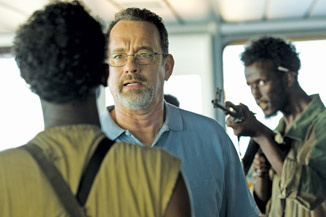The 400-Word Review: Captain Phillips
By Sean Collier
October 14, 2013
BoxOfficeProphets.com

What’s somewhat surprising is that Greengrass, despite doing the same stuff here that led to shaky-at-best results in the past, turned out an unforgettable film. Captain Phillips is thematically and tonally similar to the good-not-great United 93, and shares the military fetish that dragged down Green Zone. But this time, those elements add up to a captivating, vivid experience.
To be fair, Greengrass’s lead does a lot of the heavy lifting. As Phillips, Tom Hanks turns in one of the finest performances of his career, humorless and brave without any false notions of heroism; Phillips is not particularly likable and in no way superhuman. He doggedly attempts to control situations and outwit his captors, but he often fails and never performs miracles. The true intrigue comes from seeing a very real person endure these circumstances; Hanks makes the character feel incredibly true. (It’s mostly a one-person show, but credit is also due to Barkhad Abdi as Abduwali Abdukhadir Muse, the pirate captain.)
In Billy Ray’s script, much is made of the parallels between the crews of the giant shipping vessel and the shipwreck-in-waiting from which the Pirates attack; both criminals and union sailors are portrayed as hard-nosed guys doing what they have to for food and money. Phillips doesn’t want to sail from Oman to Kenya, but knows he must take the jobs he’s given to put his kids through college; Muse and his crew don’t want any more risk than is necessary, but face warlords barking orders for more ships and loot. The expected moments of commiseration, or at least understanding, between captor and hostage don’t feel forced; we’re led to see the truth in them. There’s nothing exploitative here. The characters are round, the situation, genuine.
The film’s final scene, which I won’t spoil here, adds a coup de grace of reality to the proceedings; it’s the kind of afterward rarely (if ever) seen in cinema, and it would be refreshing if it weren’t so hard to watch. The scene is nearly perfect; it and others like it make Captain Phillips the biggest success of Greengrass’s career.